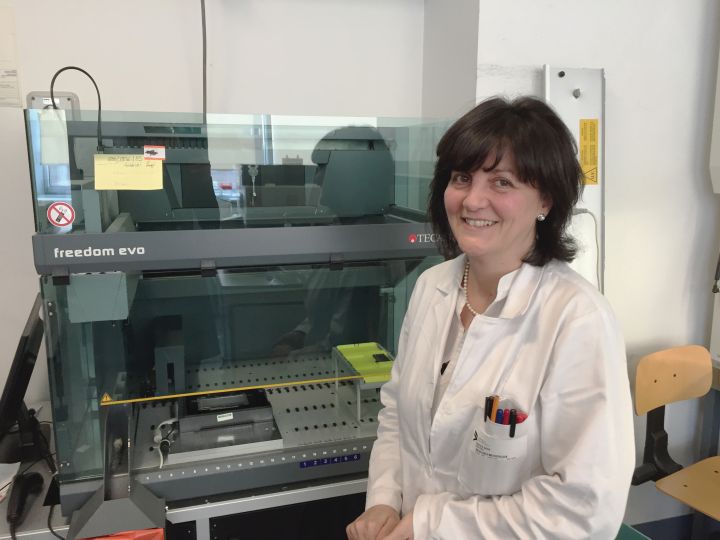Keywords:
Virology testing at a molecular level is crucial for a fast and sensitive initial diagnosis, but its role doesn’t stop there. Clinicians frequently request retrospective analysis, sometimes as a means of monitoring drug response or identifying drug resistance, and also increasingly to understand the underlying mechanisms that lead to, for example, organ rejection. The San Raffaele Hospital in Milan has developed an automated archiving system that allows safe and accurate collection of clinical samples, as well as easy access and retrieval when further testing is required.

The San Raffaele Hospital is one of the largest hospitals in Italy, with over 1,300 beds, and is internationally recognized as a leading center for clinical research. Its research hospital (IRCCS, Istituto di Ricovero e Cura a Carattere Scientifico) status and close affiliation with the neighboring Vita-Salute San Raffaele University and science park have kept the hospital at the vanguard of molecular medicine for almost two decades. The hospital’s laboratory of microbiology, serology and virology is at the forefront of these efforts, relying on cutting-edge technologies to enable routine clinical testing and research activities to run side by side. Dr Sara Racca, head of the clinical virology department, explained: “We are part of a large group of hospitals – one of 18 sites across Lombardy – and we receive over 250 potentially infectious samples each day from a large area of Northern Italy, including the neighboring Emilia-Romagna region. It is very important for us to store our samples, because clinicians often come back and ask for further tests, whether this is in relation to drug resistance, monitoring therapy, or simply asking for a test that wasn’t initially requested.”
“A good example of this is HHV-6,” Dr Racca continued. “The frequent reactivation of HHV-6 following transplants has recently been associated with neurological complications and even organ rejection but, until this link was made, it was not included in the viral test panel. San Raffaele Hospital performs a large number of transplants, predominantly bone marrow, and although it is now tested for routinely, clinicians have asked us to look at many samples retrospectively to assess the HHV-6 status of some patients. Our extensive knowledge of clinical testing workflows, particularly in molecular diagnostics, means that we are also involved in a variety of research and clinical studies, including the development and validation of laboratory instruments and tests. An efficient biobanking system is essential for this work, enabling us to properly manage all our clinical samples and patient details.”
"Automating our laboratory procedures as much as possible minimizes the infection risk to our staff, as well as saving them time, and has really helped us to avoid errors incurred from repeated manual pipetting."
The lab originally archived samples manually, transferring plasma directly from primary tubes to cryostorage tubes. In 2014, as part of the laboratory’s collaboration with Abbott Molecular, a Freedom EVO® 100 platform was acquired to improve the efficiency of sample collection, processing and storage – as well as to help the team gain better scientific insights from banked samples. Dr Roee Dvir, a clinical microbiologist in the department, explained: “We chose the Tecan system to automate our post-analytical aliquoting and sample archiving because these tasks were extremely slow and time consuming, occupying one member of staff full-time, and there was a very high potential for pipetting or labeling errors. We needed a compact and easy-to-use system that was compatible with the primary sample tubes taken directly from our clinical analyzers, and that effectively eliminated the need for staff to handle potentially infectious viruses. We also decided to integrate a 2D barcode reader onto the platform to optimize cataloging and retrieval of clinical samples, and developed a custom software interface that allows the Freedom EVO platform to communicate directly with the LIMS.”
Following semi-automated real-time PCR analysis, the original patient samples are transferred onto the Freedom EVO workstation, where 900 µl aliquots of plasma are pipetted into small 2D barcoded cryovials. They are then stored in the laboratory’s offline -80 oC freezer, which has capacity for more than 60,000 samples. Dr Dvir added: “The Freedom EVOware® software stores all the data on our archived samples, allowing us to trace any sample right back to when we started the biobank in 2014. The software automatically matches up the barcodes of original samples with the corresponding stored aliquots; we simply input the patient’s name and receive information on where each sample is stored, and the dates on which they were collected. This enables us to further investigate key dates in the patient’s care, such as when medication was changed. We now retrieve cryovials from storage several times a week for additional testing.”
Dr Racca concluded: “The Freedom EVO biobanking workstation has now been in routine use for three years, and it’s so convenient, allowing us to get on with other things while it just runs unattended. The most important thing is that it gives us the option to perform additional repetitive liquid handling tasks in the future. For example, we are currently planning to automate archiving of CSF samples, as there are a number of add-on tests under development in this field, and the intuitive user interface makes this easy to achieve. Automating our laboratory procedures as much as possible minimizes the infection risk to our staff, as well as saving them time, and has really helped us to avoid errors incurred from repeated manual pipetting.”
To find out more about Tecan’s biobanking solutions, visit lifesciences.tecan.com/biobanking
For more information on the San Raffaele Scientific Institute, go to www.hsr.it/research/about-us
Keywords:









